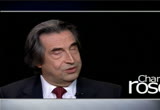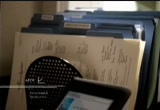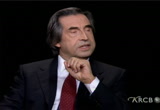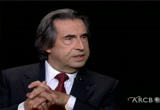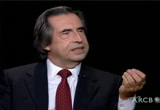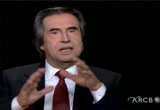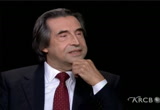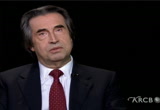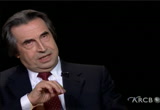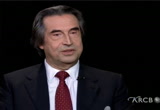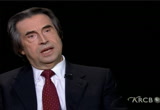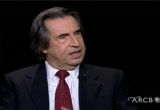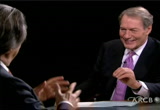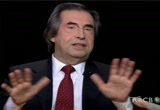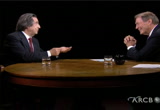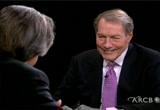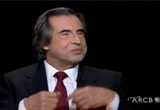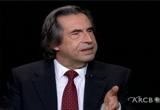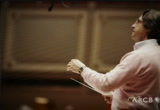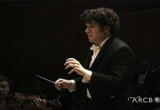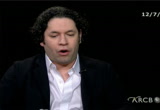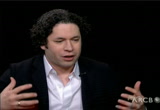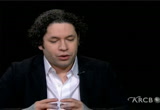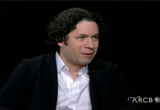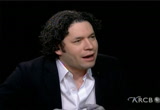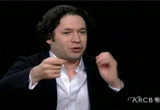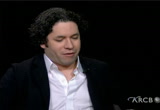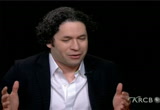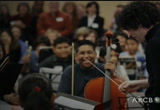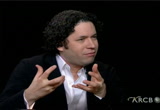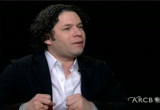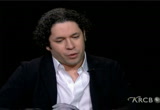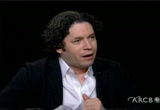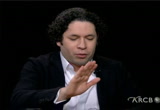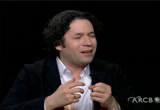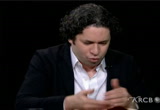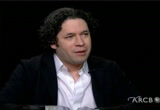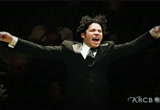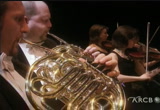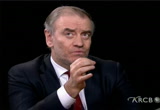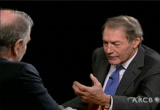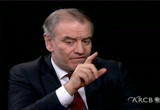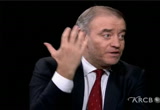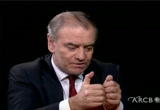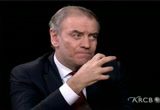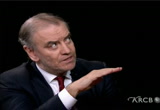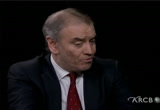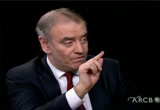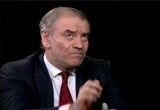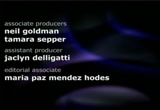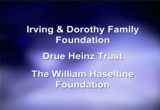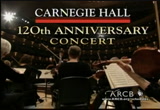tv Charlie Rose PBS December 28, 2012 11:00pm-12:00am PST
11:01 pm
>> rose: welcome to the program. tonight we bring you a special holiday program with conversation with some of our favorite conductors including ricardo muti. gustavo dudamel and valery gergiev. >> there are 100 people that are 200 eyes that are looking at you and wait for what you are-- that you reveal the sky, heaven. and many times we don't reveal anything. andweee i the eyes of the musician that they are disappointed. so you need a certain conviction. and that is sometime is considered to be outer italian. >> rose: muti, dudamel and
11:03 pm
captioning sponsored by rose communications from our studios in new york city, this is charlie rose. >> rose: master ricardo muti is here, one of the world's great conductors. he has lead some of the best orchestras including the vienna philharmonic, he is currently music director of the chicago symphony orchestra, critics and audiences alike have been dazzled and charmed by the intensity, the technique, the emotion that he and his musicians bring. here is a look at a
11:04 pm
11:05 pm
someone who wants to lead a great orchestra? >> first i didn't want to be a sician. so the first quality, i mean the first, if you don't want something and you get it. and but i studied very seriously but fortunately-- . >> rose: what did you want to be, do. >> first my father was a medical doctor. we are five brothers. and he wanted one to be a doctor, one to be an architect, one to-- my profession was opposed to become a lawyer, that would have been a disasr, total disaster. so for reasons that are too long to explain, i became a musicianment but my father never gave me the permission to abandon the regular studies. the classical studies, the university, so-- it is very important because i still
11:06 pm
can translate well in latin. and because i studied latin for eight years and for five years greek. so this culture, classic culture hashelped me. so to take some time, certain classical distance from the crazy world of music. and i still consider myself an outsider of the world of music. i am a musician, but a musician in the moment i rehearse with my musician, i do the concert and then i don't have anything to do with the world of music and musicians. >> okay. >> so supposed it's way too early. we were supposing the first paragraph of eu bit wear. >> my otuary. >> what would you want us to say? would music be in the first sentence or two? >> no, i will say exactly what i said to the meerning extras.
11:07 pm
many singers. here lies ricardo muti, a crazy man that spent all his life trying to find a correct qafer or quarter note. >> rose: in pursuit of that your life was. >> that is a dist. >> rose: b mushas be good to you. >> very, very good. you know, music is the only art. and i know this by experience that can bring people together. and make people to communicate even if they don't speak the same language, if they have different religions. so when you left lascala, why did you leave? >> as i said i was there for 19 years, longer than anybody elsement longer even
11:08 pm
than tuscanini and my relationship with the orchestra and chorus has been always for 19 years perfect. then when i had a fight with the administration, let's say, because i don't want to indicate this or that person, then everything became political. and in italy when something becomes political, and ntroversial, politically speaking then the only thing that you can do is to leave. but 19 years are part of my best years in my musical career. so i said, you know, to explain exactly details what happened is impossible. and the newspapers generally made a mess of the entire story because they didn't know exactly the details. they thought that the orchestra was against me but this is not true. >> not true, absolutely not true.
11:09 pm
i ver had a fht witan orchestra in my life. but there were reasons outside of the artistic field that created a situation and we couldn't kmup kate any more. we had completely different ideas. >> there was no one that could have made a difference? >> no, because we mentioned before this dictator, you know, in a very delicate way. but mussolini, one time said speaking abo italy, the italians said one phrase that is memorable. one phrase was interesting. they said to control it, to govern the italians is not difficult. it is impossible so in a situation like that, would have been impossible to control anything anything.
11:10 pm
so i left. >> so you left. >> and then i became a free bird. >> and how did that feel? >>antasc. at w fantastic. i had been music director all my life, since 1968. london fill harmonia, philadelphia orchestra after-- lascala, 19 years and so after so many years of hard work, not only artistically, musically but about all the other things that-- a good and honest music director has to take care of, i worked so hard that suddenly i felt i, you know, light. i have to do only music when i want, where i want, and how i want. i was-- i felt like a bird
11:11 pm
as i said before. and that was the period when the new york philharmonic asked me to become the music director. i did several coertsany concertsith the new rk philharmonic, beautiful concerts. i admire those musicians. i think that they are very good. and i have wonderful memories. so when i asked to become music director i was hesitant. i didn't know. but then i thought that it was not the right moment to be engaged again. not because i had a divorce before. just, you know, i felt so good to be free >> sthe timi wasn't right. >> si, the timing wasn't right. and then i continued to be, to be free around the world, especially connected with the vienna fill half mondayic that is the
11:12 pm
orchestra that is been connected with the-- with me all my life because i made my debut in vienna with the vienna philharmonic in 1971. and sinc then i have conducted them every year with tours, concerts, 200 concerts in salzberg. so an ormous quantity. and so i was always-- i could engage-- enjoy playing with them thin the president of the chicago symphony started to appear here and there in berlin, in vienna, in paris. and i i saw this nice lady lady in the chicago symphony and so she started to-- her esen, one, two, three, four times, her enthusiasm
11:13 pm
made clear to me that she was interested to invite me to conduct the chicago symphony. so she invited me, in fact. and i went back to chicago. i was not sure because you know after, you have conducted so many orchestras in all your life, especially in the last years. i had reduced my presence with some four or five orchestras. the orchestras are very dear to my heart. so to goack an ganize tra that i had not conducted for 30 years, i was very doubtful. i said why to go there, to find new musicians and then even if are you a nam us conductser and they are a famous orchestra, still, when this two entities meet, the first ten minutes the newsicians think okay, now we will judge him. he's very popular with vienna berlin but now it's our turn to say how good he is. and the conductor is thinking the same thing. so we are not maki muss eck. you are making a sort of
11:14 pm
>> are yaking assessments. >> and but anyway she convinced me. and i went to chicago. and when the conductor meets an organize tra, has to say something. you cannot say just good morning. beethoven fifthth. there is a sort of-- and i didn't know what to say. i thought maybe i say this you know, but the usual phrase, i'm so happy to be here with you. and they know exactly that you are going to say this. and this is nothing new but e last moment sothing ca to my min that was really true. i said i conducted you more than 30 years ago. at that time i was a young man. and a young conductor. now after more than 30 years, i don't, i hope that you will not collect the ruins of that man and that conductor. so like pompeii, you know.
11:15 pm
and they reacted in a very direct and happy way. and we start to-- . >> re: it was a maiage made in heaven. >> then i started precocious symphony number three that is a very difficult and dramatic symphoniment and from the first moment i felt that i had a ferrari in my hand. you know this is a very difficult and demanding symphony. everything i did was there. immediately with the precision and as i said, they ferrari is to the going to pay me to mention-- . rose: b youan alway drive e. >> si. and then we made a tour after this concert, that were very successful. and after the tour, a tour with the orchestra can be fantastic marriage between conductor and orchestra and musician, or it can be a
11:16 pm
disaster. because every day in a different city, the organize tra becomes tired. you are tired and to find inspiration, to inspire them, and then it's called, it's hot, the food on the ple was not good there are so many reasons, well, the concert can be a disaster. and every concert was one better than the other. and after the tour i felt also that they were wonderful human beings, not only great musicians. and after the tour i received more than 60 individual letters from the musicians, nice. saying how much they enjoyed making music with me. so that was something that really touched me. so when deborah appeared again, you know. >> deborah came and you said. >> like minner va-- minerva, then, and she invited me
11:17 pm
there. >> after again insisting and insisting, i thought they are asking me to go there. so maybe really they want me there. i don't know. i'm not young but i'm not that old to --nd so why not, this will certainly be the last engagement with an organize tra, not because there is no time. conductors sometime live too long, you know. and i said if a conductor from the room, from the door on the stage to the podium needs more than 30 seconds, it's time to retire. >> rose: it's a physical thing. >> absolutement. >> rose: but you have no great unfull if filled dream in music si. >> rose: think of the stops you've made and where you are, and you say this is the
11:18 pm
last stop as conductornd as music director of a great symphony. >> si, the last one. also because i think it is the bestment and so this is really-- . >> rose: the best orchestra in the world today is the one you conduct now? >> you know, to say the best is always very difficult. because you would say-- is but we can say certainly that there is one of the two or three greatest orchestras in the world. >> rose: who are the other two. >> certainly i would put together with chicago vienna and berlin. >> rose: and berlin. where would you put the new york philharmonic. >> it's a great orchestra. but after, i say this three. then depends on who is the driver because even a great, great organize tra can sound not good in the hands o
11:19 pm
of-- because y know, better is the orchestra more difficult is to drive. >> yes. >> it's not the contrary. >> rose: the better the organize tra the more difficult it is for you. >> for the conductor because you have in front fantastic musicians. they know exactly what you are doing. they have because of a wonderful musician their own ideas about the experience. so the conductor has to bring the musicians to his ideas. not necessarily convincing them that this is the only possible idea. but the only good idea but it is one possible idea, so convincing that they, even with the different ideas can follow you. and you can do that not in a dictatorial way but not also begging, you know, you cannot say to a musician, excuse me, can you please give me this. even if it is a story of
11:20 pm
carlos cliver, great conductor that was a friend, great friend of mine. we wer very, very good friends. and during a rehearsal, he was asking a german orchestra for a pianissimo. and the players answered almost in a rude way saying i am playing piano, i am playing piano, sometime you have this kind of answer. and clyber answered, said, you know, conductors are not dictators. we are like poor man outside the church. with our hat in the hand. and if we have one penny, we are happy. but if we receive two, we are more happy. so it was a very great answer. we ask, we don't demand we
11:21 pm
ask for something. and when you have a great orchestra, with a great orchestra you can get what you want. so if you don't get what you want, it's your fault. >> rose: it's your fault if yo don'tet it. >> for several reasons. because are you not good enough. are you not loved. we are not liked. they don't trust you. you don't have the right technique. you don't have the right charisma. there are many-- . >> rose: charisma is important. >> yeah, but in the moment you think you have car is marks you are finished. >> rose: you either have it or you don't. it's not whether you think you have it but you think -- >> yeah. >> there are people who write about you and say that you are vry authoritarian. >> si. this is not true. i say that there is no one orchestra that doesn't like me. i mean not musically, as a
11:22 pm
person because-- . >> rose: that's to the about as a person. it's about the conductor of an organize tra and music director. >> not authoritarian. one time, when i was music director of the london fill harmon ya, the manager one day came to me and said maestro, you kow sometime the players a a little bit-- when you-- they ask a question and you answer no. they take this answer a little bit with some difficulty. i said why. >> because it sounds so direct, no. i said look, it is a question of language. i'm italian and are you english. in english a negative answer is the same thing. n-o. and they said well, yes, but you know, you say "no" we say no. and that gives the impression that maybe there is a possibility, it's the
11:23 pm
same thing but with some possibility of -- >> i'm not authoritarian. it's-- i have a grandchild that is almost fife years old. his name is ricardo muti like me. and he works like me. he talks like me. and this come from my family. i had parents very, with great discipline. and teachers with ea discipline. so i was trained to-- but out of the podium i think that i, people know me very well, i am a different person. of course on the podium i cannot be a buffoon. and i don't ask with a big smile asking for a favor. i have an idea. and if i have the idea and i have spent month its, years, sometimes decades on this idea, and when i go in front
11:24 pm
of the organize tr, i have to try to-- orchestra, i have to try to make, to realize. a violinist or pianist, they are lucky. i mean it's a much more difficult profession in the end in front of the public because they have to produce the sound. we are lucky because the sound is produced by others. so many times when we make a mistake, the musicians realize immediately that you have made a mistake. the public doesn't. so you have always the possibility to blame somebody else. a violinist or a pianist or cellist, they, arumpet, they have to produce the sound. but they have the advantage that the violinist can rehearse a passage 12 hours in his room. and the violinist is not going to be angry with him, no, it doesn't answer back. with an organize tra, you must also be diplomatic and
11:25 pm
psychologist to know that you cannot insist so much abt certain things because to deal with one person is one thing. to deal with 100 persons it's another. it's another thing. >> and to make them what. >> because when you deal with one musician and speak about music you can have a wonderful conversation. but when you have a-- in front of you then the attitude is different. but it does not mean dictatorial or to be outer italian. its's-- you have to, there are 100eople that a 200 eyes that are looking at you. and wait for for what you, that you reveal the sky, heaven. and many times we don't reveal anything.
11:26 pm
and we read in the eyes of the musician that they are disappointed. so you need a certain conviction. and that is sometime is considered to be outer italian. >> rose: you've convinced me. >> gracia. at least i convinced one. we must do this again. so thank you. >> gracia, thank you very much. >> rose: we'll be back. stay with us. maestro gustavo dudamel, sir simon once called him quote the most astonishingly giftsed conductor i have ever come across. he is the music director of the simon bolivar symphony organize trav venz venses and the los angeles fill har fonic. here he is performing with the l.a. philharmonic. ♪ .
11:27 pm
>> rose: do you feel some sense of responsibility because of the position you hold now around the world to introduce the world to latin america and music? >> oh, absolutely, of course. but look, for us the most important thing is to put our music in the same level of how to say, of importance, as bthoven, as or nono,
11:28 pm
especially talking about modern composers. because when we talk about our music we are talking about music of the 20th century. especially 20th century and that is the important thing. can't you imagine, i was thinking this this is all new music for many people, you know. the concerts are sold out. you know, it's somethg very scialecause people are coming with this kind of question, you know, with this kind of what we will listen. but i think at the same time they think that will be something very special. and for us the most important thing is not of course it's the orchestra, but its music. how important is this music, to bring this music for people that are not close to
11:29 pm
th. >> rose: how was it founded? >> it was founded by maestro antonio, in 1975, i think, started as a program for young musician. we have a great organize tra in venezuela. this organize tra sim fonica devenezuela. but it was only one organize tra. was not possible for, you know, the young students to be alive through musi was only to study music and to see the possibility, to the possibilities to have a job, you know, by a miracle, really by a miracle. and what de was to create this youth orchestra. and it was a dream, because it was cay for many people t was a crazy guy, bringing young people, venezuela to play classical music.
11:30 pm
he started with 11 and he thought oh my god, what is this about only 11 musicians, at the end he had 70. anwhen they played the first concert they have 120 musicians. but now after almost 40 years we are talking about 400,000 -- >> dow take special joy in either conducting or playing and introducing music to young people? >> i think for me it's the most important thing. >> rose: is it really, to make sure that they -- >> because you you know, this is my background, you know. i group up in the systema. i was fiv years old when i started. but i always say that i started before because my father started in the systema years before in the '70s. and music was around my life, all the time. it was like i think i don't
11:31 pm
know how to say but what i remember, to remember when are you two or three years old, it's very difficult. but what i remember the most is music. is my father's study trombone. or studying-- and then i wanted to be a musician. and studying with, you know, children of my same age, doing music, playing, it is my life. and that is why for me it is so important to give the message of the power of music, for young and for children. >> but do you feel like you chose music or music chose you? >> i was in love with music. i really-- i didn't understood anything really. but i love it to listen. and i love it to read, when i was three or four years old. i remember a little book of my father's-- small book,
11:32 pm
the smell was amazing, i remember. the smell of the book. and i would open it and i was reading these black, white things there. and my father saw that wow, we have to do something with this. not only with the smell of the book but also with the. >> and how long after that did you say what i really want to do is conduct? well part of my life is really funny. because i wanted to play the trombone as my father explained. and but the trombone was too big for me. and my arm was too short. we didn't have a small trombone. now you get the chance to have an aalto trombone and you can play. >> rose: but on such matters music changes. your size did not lend itself to the trombone. >> no an i was studying theory, harmony, counter
11:33 pm
point, all of that, even composition. until i was 9 year its old, 8, and w no, no, no, because i started to play the violin when i was 9. but i went to my first concert when i was 7 years old. >> yeah. >> and my father was playing, i remember and for me was like wow, what is this guy doing there, you know, moving his hands and everything. >> in command, too. >> exactly. sitting there and all of these musicians. >> exactly. >> following, i asked my grandmother for a gift for my burst are birthday that was a bat on. >> a bat on and she bought for me. and my fach rit game was to conduct, the recordings. i remember an lp of chicago
11:34 pm
symphony conducted by daniel, lp, beautiful, with all tchaikovsky music, 1812, all of that. and i was rehearsing. i was stopping, i was stopping the recording to say this is loud. this goes down, again, i destroyed the lp, i remember but i was giving my concert with my little toys there in front. and that was the beginning. it was a vy serious gam i member that. >> rose: you took it seriously. >> you cannot imagine. you cannot imagine how serious it was. it was silence 234 my house. my house was, i don't know, 45 square meters. i don't know, there living my uncles, my grandparents, my parents. but it was a beautiful atmosphere. and i was say fog them you have to sit down and you have to listen my concert.
11:35 pm
or you have stop because i'm rehearsing now. and that was-- that was my life, what's rely, i was dreaming, you know, afr school to go back to home and to get my toys and to do my rehearsing. until i was 11 years old, and the conductor of the organize tra where i was playing, he was late. this was a youth children's orchestra, he was late. >> and there you were. >> imitating because we started that rehearsal. i was imitating. famous conductor and local conductors. and i embarrassed them, the mice row he is like this and then we started to work and i became a assistant conductor. >> you heard what sir simon
11:36 pm
said in my introduction to you. >> well that is not true. >> rose: but let's assume that that it is. what is it you have, you think in what distinguishes here from here? i mean help me understand your own sort of understanding, i'm not asking to you pat yourself on the back. i'm asking you to help us understand what it is that you have found within yourself to give. >> i don't know, i don't know. >> are you just being -- >> look, i think i think, you know, it's the loss of what i do. and that is not a secret. you know. music for me is my life. and when i am not you know, doing what i'm doing, i don't feel happy. >> yes. >> you know. and that means something,
11:37 pm
you know, that means that music is a very important element of my life. and a natural element. i think we are a new generation. and talking about young conductors, i'm not the only young conductor in the world. there are many talented couctors,ou ow, doing a great career right now. and i see more a big responsibility for us. really, charlie, i don't feel as a special person, honestly. i feel really that i'm a musician, i'm a part of the organize tra. i never feel that i'm the leader and i'm conducting to you and you have to follow me, no. i feel that i'm one more musician of the organize tra. and maybe that is something em that people feel, you
11:38 pm
know, that you know, that it is not an element destructing the music and what the organize tra is doing. it's only an almost element. >> when we watch you with the baton, are we seeing what the music is doing to you at that moment? are you simply taking it in, that's where the energy and that's where clearly the direction comes from the score. >> yeah, absolutely, yeah. it's the muc. 'she music. i study a lot, really. and i'm studying all-- . >> rose: study what. >> you know, i love to go deeply in music. >> when you study the dor what are you looking for? what is if that speaks to you? >> what speaks to me? well,. >> is it knowing where the computers head was? what he was or she, what he was thinking at the moment s it getting to what might have been at the moment that
11:39 pm
that noteas ken from this head and this heart and put there on that page? >> you start to think from that point. but at the send, remember that you are recreating. you are recreating, so sometimes let's put the example of the beethoven. beethoven is a kpotser very difficult to approach because you have let's say rules in david tobin music. yohave to u a small orchestra. you have a very special kind of sound to approach. but at the end there is subjective because i'm sure that beethoven at his time, he had an organize tra, of 150 musicians. for him, you know, i can't imagine. it's a letter by mozart saying to his father, father,
11:40 pm
i am so happy because i have an organize tra of 40 violins. have flutes. i have 14 double bases. and when you play mozart and approach mozart, awe approach its with a small organize tra. you know how subjective is that. how he was happy. and how sometimes you, you try to be oh my god, no, i cannot go like that because this will not stop. i know that we have, the element of the sound that we have to build. but that is the amazing thing of music. the subjective point of music, how different it can be. and at the moment that the composer put the notes there is still beethoven, still mozart. but with the time you are recreating that. and it's still mozartment but in your own idea, in the
11:41 pm
idea of the element that you have in front, the organize tra, because also there is another thing. organize tras react differently. every organize trament and every organize tra has a different personality, with the sound, with the expectment, with everything. so that, that is the war of the conductor, how to deal with that. because i cannot go to an organize tra and conduct beethoven in the same way that i can with the simon bolivar orchestra, it is impossible or with the l.a. philharmonic or the vienna philharmonic. you have to deal with the tradition to respect what they have, and to bring your ideas and to have, you know, like it's a 50/50, you know. >> rose: but it means that music can be defined by different conductors and different organize tras. and that's part of the genius of it all. you can hear it in a different way and at the
11:42 pm
same time what that composer has done has to be so extraordinary that it lends itself to that and maintains its original creative impulse. >> is and the most amazing thing that you can play two times -- >> the same organize stra, sameonductor, you play. and th youlay it a second time and it's different. it's a little different. >> even the next night. >> even if you are plague the same night, the same symphony two times. it's the ability and again the power of the music to play with that, subjective. it's so objective because it's music is there. you have the paper there but how can be you have million of ways. >> what is it that you want to be and accomplish over
11:43 pm
the next five years? >> well, it's to go deeply in what we do. you know? >> so the beethoven you see five years ago may be different thanned beethoven you see today. >> but you cannot imagine how different it can be. but when i study and i see what is i was doing because i mark my score, i think why, how i was thinking that five years ag i n be impressed sometimes for the reaction of what the music was giving to me at that time. but then when i have this chord here and i see well, i didn't saw this. maybe i will binge bring this. i see oh this is really difficult. it going deeply and deeply the develop of the way to think about music. and of course you know sometimes people expect for you to be to ha the
11:44 pm
knowledge and the experience of a 50 or 60 years old conductor, you know, sometimes people compare you with-- it's impossible to compare, you know, because they are masters. and i'm sure when they were young they were doing -- -- they were searching. they were thinking the way that they develop at the end. and it's fascinating because what i see in five years my life i see my life conducting an trying to understand what i am doing now, more deeply. >> rose: continued success. back in a moment. stay with us. valery gergiev is here, one
11:45 pm
11:46 pm
oork extraalso coming out with a recording of the wagner rincycle. >> yes it's a maj pcedure ject. and we already recorded it. it is a half of the ring cycle it will be a major recording simply because it comes from great concert hall. >> rose: which one. >> marinski concert hall, the new one. we built it five years ago but it is definitely one of the greatest halls with acoustics you can call it strad yarruous-- stradivarius or-- is not just a construction, it's an instrument. theay we built it was to make only one was to create an instrument it make-- it sounds incredible. to make a recording in this hall t is a dream come true but also it is a luxury
11:47 pm
because you have an organize tra, and voices who hear all the colors they can produce immediately. it's very important psychologically for artists to know that nothing will be lost. and the val kerry has a tremendous cast. it will be out very soon in the u.s. they will make a presentation. but i'm veryuch looking rward to fish this project. and we have best russians and best what you call western voices, among them reneee poppin or-- kaufman or nina, of course major, major names which are known as wagner singers. but also fantastic russian voices. i think it makes it all together a very interesting combination. >> is there something that would represent your great cowhering ambition and achievement in muss smick? i mean you ha you're builder beyond a conducter. you do all these things.
11:48 pm
you now celebrate what the 25th anniversary. >> 25th at marinski. >> as my music directorship, 25, artistic directorship which is a good distance it is not a small distance. >> and i saw soviet union falling apart. i saw russia being totally young country trying to build democracy but also trying to save whatever national wealth was there. waseryiffult to understand. was it just gas, oil, was it rivers and forests, was it a vast, vast country, huge territory but also culture. i represent maybe not such a group of people which talks every day but it was a group of people which always reminded everyone that use your culture, it may be biggest loss you have. of course national resources always, people talk, oh, energy, of course, important important today for everyone in the world.
11:49 pm
what about culture? we think is always imrtanto he both. >> yeah and your responsibility is for its culture. >> i do my best and i perform quite often. >> so is your friend vladimir putin responsive to that? >> i think he supports. first of all i done see him often maybe three, four times a year, i have known him for 20 year, long before he was a president. >> in saints petersburg of course. i was rather nonman already then because i lead such an institution. in a way, face of the country. so you get rather famous, if are you on the top of this institution, leadership, you represent immediately a lot even if you don't deserve it yet. you already represent 230 years tradition, glorious tradition. but the good quality of today is he understands that treasures of national culture and you don't take
11:50 pm
it like a-- just another item, i think. we are building now in europe a hou. 2 is importtor us to have such an incredible opportunity, a platform where we perform op ra, sim fonic music, educational projects will go up immediately because all the schools, universities, city of five million people. you can perform one leg nut cracker 20 time ace year, you can perform 50 times a year, each of those 50 nuts crackers a year you can devote 40 to schools it is a huge opportunity to help young people understand their part draft decision. because of course they have all these toys and also kid does it all the time but they will go for the first time at 8 or 9 years old to see the magic of theatre. most of them will come back, we know that most of them will come back.
11:51 pm
it's much easy everto start at 8, 9, 10 and then understand ballet, opera, theatre, music, rather than do it when are you 25, 30 for its first time. it's too late, ybe. >> back to politics for a moment when you look at russia today, democracy, economic growth, human rights, press freedom. where do you think they are on those issues? >> i think for the country which has 20 years history, if you start from breakup of soviet union, things are looking better than do they. in the scenario in which i saw myself 12 years ago, the country was to disintegrate because there was no unity and we could see it, we are could feel it and the historical role of putin and his colleagues, don't forget about the government he had, the names ring familiar, the
11:52 pm
minister of finance and economy who introduced the change. the economy started to work. everyone thinks it is oil prices. no. it is oil price, one element, is important. but also how government and how leadership of the country work together in order to make rul and circumstances for the growth and also for young people to get jobs, for example. look at spain now. the word is at 50% of young people on unemployment. >> rose: that is the number. >> it's terrifying, correct. >> rose: yes so then at 25 you don't know how every second, young professional doesn't know where he will work. so russia does maybe a little bit better than average in europe. with human rights, well, the stories get fams, ey even get more famous than the killing of miners in
11:53 pm
south africa which amazes me in the modern world. >> rose: you mean the story does get a lot of attention. but there were even medvedev thought, had some question about how long they should be in prison. >> i think they should not even talk about seven years, that's ridiculous. >> rose: i mean your friend, the president could stop this in a second. >> well, i don't think first of all he's thinking about how to put these girls in prison in the first place. most of the people in russia were disgued with the fact that they went to the biggest-- . >> rose: they didn't approve-- it is one thing not to approve what they did, it was a is a tire about him, yes. >> i think i separate. it's to the about him. it's about country. in any case i hope there will be much more peace this is why we are here. and i think in russia just to answer very important question you asked me, i think russia needs now in the next, three, five years
11:54 pm
let's put a short distance of 3, 5year, a certain unit. the leadership of russia is a complicated thing. for example my very good friend ex-finance minister who spent 12 years as a finance minister of russia, maybe being one of the best financial ministers in the world, doesn't even realize it's not necessarily coming from here or from england. sometimes from other countries, they are very brilliant people there. so he demonstrated. >> what? >> the art of being a leader in the fferntion world, especially when you have big country and hundreds of billions of debts. and in two, three, four years, countries in much better shape went up, i repeat, the country doesn't have-- has very little, you know, russia is today, blessed maybe with this comfortable situation that we don't have trillions in
11:55 pm
debts. today it would be like this. in america it is different. but someone at some point will be responsible. it's to the good to think that our cldren have to pay price or grandchildren this is not helpful. and-- is one of the most prominent figures in russia, always was rite hand of putin. and looking at financial situation, looking 59 problems everywhere in russia, very steadily, very quietly without many, many interests, the situation became much better so country is not the healthiest in the world. but i feel somewhat healthier than many or maybe even healthierhan most. freedom of press, i think in russia the complications are that press represents either public opinion but not always. or corporate interests, very
11:56 pm
often, very, very often. this is adventureous so it is around the world. corporate interests, very mighty powerful corporations macking huge money. they, i don't think they make it a secret but they have to put the interests first and big part of russian press will be somehow on their side. >> thank you for coming, pleasure to see you. >> my pleasure as always. >> rose: thank you for joining us, see you next time 69 captioning sponsored by rose communications captned media access group at wgbh access.wgbh.org
202 Views
IN COLLECTIONS
KRCB (PBS) Television Archive
Television Archive  Television Archive News Search Service
Television Archive News Search Service 
Uploaded by TV Archive on

 Live Music Archive
Live Music Archive Librivox Free Audio
Librivox Free Audio Metropolitan Museum
Metropolitan Museum Cleveland Museum of Art
Cleveland Museum of Art Internet Arcade
Internet Arcade Console Living Room
Console Living Room Books to Borrow
Books to Borrow Open Library
Open Library TV News
TV News Understanding 9/11
Understanding 9/11

